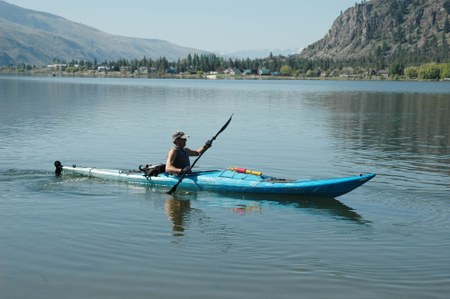
Why would a legendary mountaineer paddle all 1200 miles of the Columbia River and then write a guidebook about it?
Well, for starters, John Roskelley loves adventure and challenge. You don’t climb 7,000 and 8,000-meter peaks in Nepal, India, and Pakistan (including his 1978 ascent of the Northeast Ridge of K2 and the first ascent of the West Face of Gaurishankar) without an insatiable thirst for exploration, and an ability to be at ease in dangerous situations.
But if it was only adventure he sought, John could have paddled the river and left it at that. Instead, John wrote Paddling the Columbia because he wanted to inspire other paddlers to recognize all that the river has to offer, from remnant salmon runs, to gorgeous bluffs and wetlands inhabited by myriad birds, to water that runs clear and cold.
“As I was paddling a particularly beautiful though lonely stretch … the idea of a guidebook took root. Not having seen a paddler on the river to that point, I realized that this amazing resource was completely underused by the very people who would protect it and be willing to challenge government and industry, when those entities’ needs seemed to outweigh those of the public, tribes, and fish,” --Roskelley, in Paddling the Columbia.
Hear about more of his story as John kicks off the 2015 BeWild Speaker Series on March 17. Join us for his talk, and find your own inspiration to discover and explore the Columbia River. Like his guidebook, John will open the river up to everyone to enjoy day-long stretches and weekend journeys, or—maybe—to take on the whole length.
John’s hope is that more paddlers, birders, and low-impact recreationists will get to know this river and be inspired to speak up for it. As he says, “The river today is a survivor on life-support that will not last forever unless we speak with our politicians, and demand changes in how the river is used.”
American Whitewater, a national river conservation organization, will be on hand at BeWild with more information about opportunities to get involved with current Columbia River conservation efforts.
 Lace Thornberg
Lace Thornberg